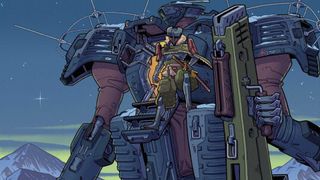Two of the best tabletop games on the market right now aren’t on the market at all
Two tabletop RPG trailblazers are taking accessibility into their own hands

Tabletop gaming is, increasingly, becoming a space for big players. And while the high tides flooding the market are certainly raising ships, two of the best and most accessible games available right now are defined not by their mass market appeal, or shopfront square footage.
Here are two of the best, and cheapest, tabletop games you can play right now.
Android: Netrunner

Netrunner is a thrilling, asymmetrical card game. Players take the side of the Runner, a vigilante hacker, or a large megacorporation, the Corp. Corps play most of the game face down, with skilled players bluffing resources into dummy servers to divert Runner attention, relying on a firm hand and a poker face to edge out wins. By contrast, Runners require canny assessment of board states to break through Corp defences. As such, every game feels like it’s on a knife’s edge, won by thin margins of deception or luck, very rarely dominated by one overpowering strategy.
The general feeling of Netrunner is adorably clandestine. The game is shipped directly to you, unadvertised. Meetups are organised organically, between groups of players (usually digitally connected) that, although typically not advertised, are impressively widespread. Discussions are hosted largely not on big social media sites, but specialised forums like netrunnerdb. The network of card-game jargon and keywords, typically forbidding, opens up into a coded, cyberpunk lexis. The gameplay from the runner side is scrappy and low-resource, going from biting at Corporate ankles to dragging your opponent down to street level, while the Corps balance public-facing initiatives and back-alley deals to crush opposition.
Its absence from shopfronts belies a level of fun and replayability that even the biggest publishers should covet
Materially, Netrunner plays out more like a hybrid between a traditional TCG and the best board games. Play is invariably one-on-one, and creative deckbuilding is encouraged by the game’s focus on bluffs - but cards are released not in randomised packs, instead dropping entire sets in expansions that ensure scarcity is a non-issue. If this monetisation system seems generous to you, it’s because it is; Null Signal are a rarity, a nonprofit publisher that charges only to cover printing and shipping costs - and if even that price is too much of a barrier, home-printed cards are supported even in the game’s world championship series.
If the point has not yet come across, let me be absolutely clear. Android: Netrunner sports a shockingly good price point and focus on accessibility for a game of its quality and breadth. The game is, at worst, cheap, and at best, free (if you play online); the community is enthusiastic and welcoming ,and the game itself is endlessly inviting. Its absence from shopfronts belies a level of fun and replayability that even the biggest publishers should covet, and you’d be remiss to sink time into large-scale games without giving this one a shot.
You can find out more at Null Signal Games, a non-profit made up of volunteers trying to keep Netrunner going after it was discontinued.
Sign up to the GamesRadar+ Newsletter
Weekly digests, tales from the communities you love, and more
Lancer

Lancer, by contrast, is a tabletop RPG centred on mech combat. Mechanically, it’s brilliantly crunchy and intricate; the whole thing is built less around class system seen in the best tabletop RPGs and is more so like a modular toolbox of abilities that expands and interlinks as players progress. Lancer thrives on player creativity, with players encouraged to manoeuvre through various mech licences and player abilities to pull together a cohesive build, that itself can change and meld into different forms between missions.
In Lancer, you’re always playing on multiple axes - hacking or physical damage, singular versus team play, eliminations and objectives. The joy of the game thus evolves to be all about plate-spinning, attempting to keep your gameplan alive through the absolutely game-warping effects that are attached to a lot of mechs. In fact, over the course of most games I’ve run, the players’ builds become defined strongly enough that the game masters’ attention is caught, responding by utilising enemies, sitreps, and terrain designed to catch them out, quickly evolving into a delightful game of cat-and-mouse, with players and GMs alike always on their toes, ready to change tack to avoid the other. Facilitated by the game’s progression system, it’s a dynamic that I haven’t found before or since in another game, a wonderful emergent metagame that has to be seen to be believed.
Staying caught up with character options is (and likely, always will be) totally free
This is, of course, keeping in mind that from the player side, Lancer is 100% free. The game’s core rule book is available free on developer Massif Press' website, and the only paid book necessary for Lancer is the $25 GM core book, a five-hundred page monster that contains more than I’ve ever needed to run a game. Most notable is Massif’s policy on expansions, regularly published adventure modules that, crucially, release all mechanical content free alongside the paid story, meaning that staying caught up with character options is (and likely, always will be) totally free.
Many of the best tabletop games are getting heavy discounts in honor of sales season, so we've rounded up the most tempting offers on our page of Black Friday board game deals.
Hal is a freelance writer with a particular interest in tabletop RPGs and board games.
Most Popular


